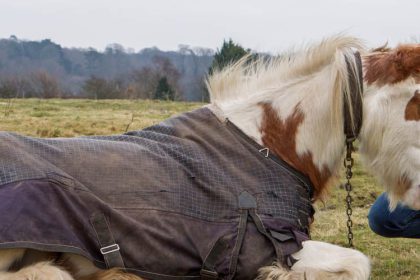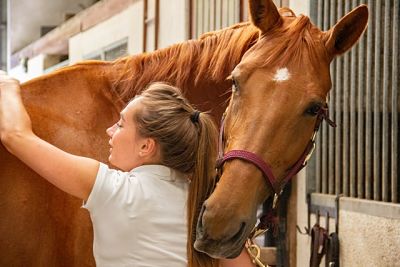Many yards are running at a loss or at best at break-even levels – others are run to subprime standards in an attempt to cover costs. There are others run simply to cover the cost of the yard owner’s own horse/s.
Owing to financial pressure and the inflexibility of some horse owners, stress levels in some yards are high at management level. Many owners/managers are simply closing down owing to financial pressure or from the stress of dealing with inflexible owners.
Good staff are difficult to find/keep. Why? Because there is little encouragement or chance of advancement if staff remain at the same place of employment.
All over the country we are hearing about Livery yard owners / managers leaving this sector. There are some who own their own yards & land who are diversifying into storage / dog exercise areas etc. or are simply closing down owing to costs and hassle. Many horse owners are therefore considering running their own yards. Would you support a change in this industry?
We as horse owners along with leaders and managers in this sector, could change how livery yards are run and supported by horse owners if we all pulled together. However, the Livery Yard industry as a whole has no spokesman or single co-ordinated support group or organisation even though it is probably one of the largest sectors in the equestrian industry in the UK. There are societies and associations with livery yard memberships but they are self serving for approval systems rather than there for the good of the yards. With Livery Yards in Scotland looking likely to require a licence to operate in the near future, it is fairly vital that some sort of independent group who would support and represent all types of yards is vital for England.
The Lingfield Livery Yard Managers course has been selling well for the last 6 months owing to this fairly major crisis in the Livery Yard sector of the industry. Those owners who are given notice to quit their yard owing to closure are looking to run their own yards.
With so many yards closing down, it is believed that the only way things are likely to improve in this sector of the industry is if horse owners are prepared to pay a proper and profitable rate for stabling, grazing and livery fees in future.
Prices of livery must rise. Yard owners with good business practices in place must be brave and set proper prices for their services. Yard owners need to consider more carefully the structure of their business in relation to their profit. Yard owner/managers must also give consideration to how they approach pay for both employed and freelance grooms, along with job roles, incentives, ongoing training perks (even for freelancers) and working conditions for staff. All this will undoubtedly cost the yard owner/manager money.
Who or what will finance this? It is clear that an increase in livery fees must be in put in place if this sector is to prosper or even survive.
Freelance grooms are a hugely important support group within this sector – without them many yards could not survive.
Higher livery charges should result in 2 positive things. Grooms being paid a decent wage (generaly it is simply the minimum wage or a little more). Yard owners wages (income) will rise.
The negative outcomes are likely to be Many horse owners will no longer be able to afford their horses. There may well be welfare issues as a result of a. above.
Charging proper and profitable rates, will provide more income and profit.
This would enable yard owners to provide perks for staff and in some yards encourage staff to work towards promotion/advancement and increased wages. Staff would be encouraged to stay put in the same job thus reducing the job hopping we have today with grooms moving from yard to yard in the hope of finding a better job.
Currently however, there is rarely a ‘better job’.
A groom’s work on most yards entails mucking out, sweeping, rugging, bringing in, feeding etc. it rarely involves riding (yet this is how many youngsters became interested in this work in the first place). Rarely does a yard offer more than this basic work for their groom/s – incentives or perks are rare in the extreme. Life for the groom is limited in prospects for future advancement.
Grooms need a some sort of structure to their career and working life.
Currently for most grooms – especially for many freelancers, a position or role with no future is a dead end job. Few yard owners take this on board. Offering a job or role where there is hope for advancement, promotion and a decent wage could and should be the way forward for even the smallest yard.
Encouraging staff – whether freelancers or employed, to be more involved in some of the managerial tasks would provide an increased understanding of management skills and bring value to the work.
If grooms are to feel valued and part of the team, involvement perhaps with reviewing yard rules and safety practices etc. could be encouraged and should be incorporated into job descriptions and interviews.



Receive latest news and industry insights straight to your inbox.